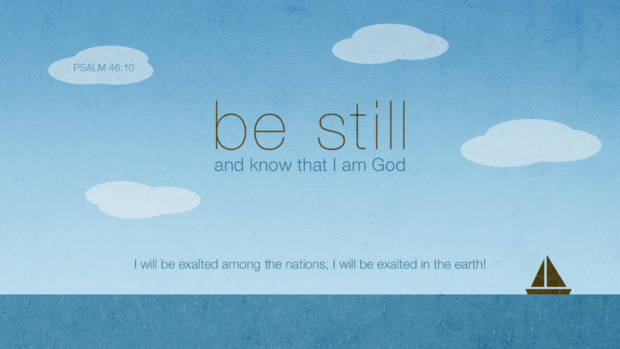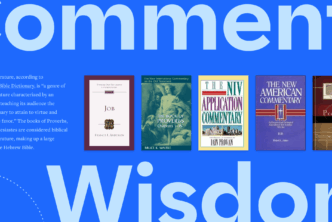If you’ve spent any time in church you’ve probably heard this verse: “Be still and know that I am God” (Ps 46:10 ESV).
But what does this verse really mean, and how is it even possible to “be still and know”? Let’s find out.
- 8 different angles on what this verse means
- What it doesn’t mean
- So how do we be still?
- Not the end of the story
- A word about knowing
- 3 sections, 3 ideas, 3 reminders
- The view from higher up
- The rest of the Bible: 5 parallel verses
- What now?

8 different angles on what this verse means
There’s little doubt Psalm 46:10 is a favorite or even a “life verse” for many Christians. It’s the kind of passage that inspires music, fills powerful sermons, and graces scenic posters of placid lakes or quiet mountains. It’s quoted much.
But “be still and know” has been interpreted several different ways over the years—even (or particularly) among Bible translations and paraphrases.
Here’s a look at verse 10 from several different perspectives:
1. Contemporary English Version
Our God says, “Calm down, and learn that I am God! All nations on earth will honor me.”
2. Holman Christian Standard Bible
“Stop your fighting—and know that I am God, exalted among the nations, exalted on the earth.”
3. King James Version
“Be still, and know that I am God: I will be exalted among the heathen, I will be exalted in the earth.”
4. The Message
“Step out of the traffic! Take a long, loving look at me, your High God, above politics, above everything.”
5. New Living Translation
“Be still, and know that I am God! I will be honored by every nation. I will be honored throughout the world.”
6. Orthodox Jewish Bible
“Be still, and know that I am Elohim: I will be exalted among the Goyim, I will be exalted in ha’aretz.” [Ha’aretz is Hebrew for “The Land of Israel.”]
7. Complete Jewish Bible
“Desist, and learn that I am God, supreme over the nations, supreme over the earth.”
8. Wycliffe Bible
And he saith, “Give ye attention, and see ye, that I am God; I shall be exalted among the heathen; and I shall be exalted over all the earth.”
What it doesn’t mean
No matter what a particular version or interpretation says, “be still and know” may ultimately sound like a simple command that most four-year-olds should understand. But to dig deeper into its meaning, pastor and Bible teacher Joe Stowell tells this story about Psalm 46 and his growing-up years:
I grew up in church where I heard this verse a lot of times. And I have to tell you that I used to think this verse meant to stop wiggling. Probably a holdover from sitting next to my mother in church. I actually still have her fingerprints embedded in my knee.
Like, “Joe will you please stop wiggling and be still!”
Well if that’s what it means, it doesn’t make a whole lot of sense. So thankfully if you read this in the original language—the psalm was written in Hebrew—it’s got a much deeper, more profound meaning.
It literally means to cease striving.
And interestingly enough, there’s a metaphor that goes with this Hebrew word; it literally means to put your hands down by your side.1
So how do we be still?
Cease striving. Put your hands down. While that can make perfect sense, all the best explanations of this verse turn stale on our intellectual shelf if we fail to put them to work in real life.
So how then do we do that? How do we actually succeed at being still? Here are a few suggestions.
1. If we’re striving and working every angle to know God on our own terms and with our own steam (or strength)—we give that up.
Instead—
We lay whatever remains of our efforts at the feet of Jesus. It’s a conscious decision, an act of surrender, a transfer of wills. Because God is our only refuge and strength (Ps 46:1).
2. If we’re filling up the silence between ourselves and God with our own self-centered requests and worries and chatter—we stop that.
Instead—
No matter what gives way underneath or around us, we turn over our fears to him in prayer (Ps 46:2). And then we leave them there, in his hands.
3. If we’re running on empty just to reach and preach and teach and serve and (even!) do good—we stop that, too.
Instead—
We camp out at God’s river, drink from his stream, and enjoy his nearness (Ps 46:5). That doesn’t necessarily mean we give up all our efforts. We don’t stop reading and searching the Scriptures, for example! We keep showing up. But it does mean we shift the trust and source of strength from ourselves to God’s Holy Spirit. And that can be a lifelong exercise in humility.
4. We can ask God to open our eyes to what he is doing all around us (v. 8) and give him all the credit (Ps 46:10).
And with that, perhaps, we learn to be and remain still. But that’s just the beginning!
Not the end of the story
Let’s take another look at the rest of Psalm 46:10. This is the part that often gets overlooked.
Because our tendency might easily be to sit back, relax, and put our feet up. Sometimes the world urges us to contemplate, cogitate, or meditate. And that can be a trap.
Not that there’s anything necessarily wrong with thinking things over. But note that verse 10 doesn’t stop with “Be still” or “cease striving.” It goes on to remind us to “know that I am God.”
And that’s the key to this verse: know.
Here we see a deeper level of knowing, coupled with quietness and trust. And it’s specifically an active command, not a passive emotion. As we see in the surrounding psalm:
- We can know and be assured that he is God (v. 10). That kind of knowledge guides and flavors our outlook and life decisions.
- We can know that God is our refuge, fortress, and strength (vv. 1, 11). That kind of knowledge gives us direction in the face of adversity.
- We can know not to fear—no matter what happens around us (vv. 2, 3). That kind of knowledge helps us not to panic, and keeps our stress levels down.
- We can know that God is in control of history and circumstances (v. 9). That kind of knowledge keeps us looking forward with real hope and optimism.
- We can know that God is close (v. 5). That kind of knowledge prompts us to live in obedience when we’re tempted to quit.
- We can know that God will be exalted around the globe (v. 10b). That kind of knowledge keeps us focused outward as we share the hope that is in us.
A word about knowing—and knowing
Words matter. And when God commands us to “know” that he is God, Psalm 46 uses a Hebrew word sometimes loaded with more meaning than we typically ascribe to the English word “know.”
A whole lot more meaning.
We might know the score of a soccer game, for instance, or know the answer in an algebra quiz. We might even know our neighbor, and that’s all very good. But the Hebrew word yada’ can reach much deeper, depending on the context.
“The connotation of the Hebrew verb ‘knows’ generally signifies the most thorough and/or intimate knowledge (often described as a thorough experiential knowledge) of what is known,” says The Moody Bible Commentary.note]The Moody Bible Commentary, eds. Michael Rydelnik and Michael Vanlaningham (Chicago: Moody Publishers, 2014), 760.[/note]
Oh! So the Hebrew yada’ may include a lot of knowing, and at the deepest level. But it’s God’s design as well as his desire for us.
That said, let’s see what else we can pull from this psalm.
3 sections, 3 ideas, 3 reminders
The rest of Psalm 46 is fairly short (only eleven verses). It is, however, a perfect devotional go-to for when the world seems crazy (when does it not?) or when life is a challenge (when is it not?).
But keep in mind that Psalm 46 was originally penned as a song. So in keeping with the musical theme, and with the command to “be still,” a recurring musical or liturgical word keeps popping up in this psalm, and it is worth noticing:
“Selah.”
The word is sprinkled liberally throughout the rest of the psalms, but here appears at the ends of verses 3, 7, and 11 (the end).
While the exact meaning is lost to time, we can today make a pretty good guess. The Lexham Bible Dictionary (which you can get for free) says it may refer to silence, pause, or an interlude.2
And the selah pause breaks this psalm into three distinct sections:
Section 1: A very sufficient God (vv. 1–3)
In the first section, the psalmist lists natural catastrophes that threaten from every side, from earthquakes to terrible storms to mountains that move. (That’s a scary image!)
Still, the psalmist declares, “God is our refuge and strength.”
Which means that there really wasn’t anything to fear in the first place. And after describing all the outside chaos, it’s time to reflect for a moment. Selah.
Section 2: God is here (vv. 4–7)
This portion of the psalm opens with a river “whose streams make glad the city of God.” Remember the river in Revelation 22? God was there in the midst. And the river in the garden of Eden? In Psalm 46 we find a similar word picture.
With this pure river watering our personal real estate, God is in the midst of whatever challenges we face, even when everyone around us panics. Even when nations rage and kingdoms totter (v. 6).
He is our safe fortress. Our response? Now again we rest.
We say, “Selah.”
Section 3: God wins. Relax. (vv. 8–11)
When we witness God’s ultimate power (vv. 8, 9), there’s only one sensible response. He will be lifted high and celebrated! His power can end all conflict. His power cannot be matched.
Where does that leave us? Right back at verse 10, of course: “Be still, and know that I am God.” Funny how that works, right?
Here and elsewhere, how many times does Scripture tell us to not be afraid, but to rest in his strength? That’s a rhetorical question. But for similar assurance we can refer to Deuteronomy 31:6, Hebrews 13:6, Isaiah 35:4, Joshua 1:9, Psalm 23:4, John 14:27, or any number of other verses.
How many times must we be reminded that he is there? Be not afraid.
With that in mind, the psalm closes with the third and final “selah.”
Three times “selah.” Three rests. Three reminders.
The view from higher up
We’re getting to know this psalm a little better, right? Now we pull back to see how “Be still and know that I am God” fits within the rest of Psalm 46—but this time according to several trusted Bible scholars.
By the way, these commentaries are all available digitally from logos.com. The Faithlife Study Bible is free.
From the Faithlife Study Bible:
Psalm 46 is the first of several songs of Zion (Psalms 48; 76; 84; 87; 122) that celebrate God’s presence and protection. These psalms focus on Yahweh’s presence in Jerusalem (Zion is the location of the Jerusalem temple mount). After identifying God as the Provider of refuge and strength, the psalmist celebrates his protection in natural disasters (verses 1–3) and from enemy nations (verses 4–7). The psalmist invites people to behold Yahweh’s works in general. He quotes Yahweh and concludes by reaffirming his protective presence (verses 8–11).3
From Matthew Henry’s Concise Commentary on the Whole Bible:
Verses 6–11. This shows the perfect security of the church, and is an assurance of lasting peace. Let us pray for the speedy approach of these glorious days, and in silent submission let us worship and trust in our almighty Sovereign. Let all believers triumph in this, that the Lord of hosts, the God of Jacob, has been, is, and will be with us; and will be our Refuge. Mark this, take the comfort, and say, If God be for us, who can be against us? With this, through life and in death, let us answer every fear.4
From Coffman’s Commentaries:
“Be still, and know that I am God” (Psalm 46:10). Many times it is God’s will for his people to work with all their might; but, now and then, when all human endeavor is of no avail, and where there seems to be no hope at all, it may be time to “Stand still!” Thus it was before the Red Sea, when Moses commanded Israel, “Stand still, and see the salvation of the Lord” (Exodus 14:23).5
From Psalms (Tremper Longman III):
Christians who read this psalm believe that God no longer makes his special presence known in Jerusalem or, for that matter, in any specific physical location. Jesus taught that the temple would be destroyed. He said, ‘I will raise it up again in three days’ (John 2:19), which the disciples later realized was a reference to the resurrection. In other words, Jesus saw himself as the very presence of God, rendering a building representing God’s presence on earth obsolete (see also John 1:14). The tearing of the curtain of the temple at the time of Jesus’ death also indicates the breaking forth of God’s holy presence throughout the world (Matt. 27:51). In other words, when faced with the chaos of life, the Christian reader of the psalm finds confidence in Christ’s presence with them (‘surely I am with you always, to the very end of the age’, Matt. 28:20). 6
The rest of the Bible: 5 parallel verses
Here’s one more comparison. It helps to know how other portions of Scripture run alongside Psalm 46, and that together they weave a larger context—the bigger picture.
Of course, all verses with similar wording are not identical twins in thought or intent. But we can understand Psalm 46:10 better when we gain a better sense of the Bible framework.
“Be still”
“But the Lord is in his holy temple; let all the earth keep silence before him.”
—Habakkuk 2:20
“Be silent, all flesh, before the Lord, for he has roused himself from his holy dwelling.”
—Zechariah 2:13
“and know”
“That they may know that you alone, whose name is the Lord, are the Most High over all the earth.”
—Psalm 83:18
“Know that the Lord, he is God! It is he who made us, and we are his; we are his people, and the sheep of his pasture.”
—Psalm 100:3
“Elijah the prophet came near and said, ‘O Lord, God of Abraham, Isaac, and Israel, let it be known this day that you are God in Israel, and that I am your servant, and that I have done all these things at your word.'”
—1 Kings 18:36
“So now, O Lord our God, save us, please, from his hand, that all the kingdoms of the earth may know that you, O Lord, are God alone.”
—2 Kings 19:19
What now?
Thankfully, the process to “be still and know that I am God” needn’t end with this article. For the believer, it’s a lifelong process! And knowing God begins with knowing his inspired Word.
Here, then, is one good way to do that.
For personal Bible study, the free version of the Logos app includes more than twenty-five digital resources, including:
- 5 different English Bibles
- 2 audio Bibles
- 2 commentaries
- A study Bible, devotionals, maps, and more
The Logos app opens the door to an essentials-packed theological library. Download the free Bible study resources today.
- For more context, watch <a href=”https://www.youtube.com/watch?v=8M-gzhEcBrc”>this video</a> of Dr. Stowell’s message on Psalm 46.
- Lexham Bible Dictionary, eds. John D. Barry et al. (Bellingham, WA: Lexham Press, 2016).
- John D. Barry et al., Faithlife Study Bible (Bellingham, WA: Lexham Press, 2012, 2016), Ps 46:10.
- Matthew Henry, Matthew Henry’s Concise Commentary on the Whole Bible (Nashville: Thomas Nelson, Inc., 1997), 494.
- James Burton Coffman and Thelma B. Coffman, Coffman’s Commentaries: Psalms (Abilene, TX: Abilene Christian University Press, 1992).
- Tremper Longman III, Psalms: An Introduction and Commentary (Nottingham: InterVarsity Press, 2014).






